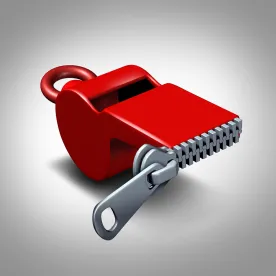On August 10, 2021, the Senate passed the bipartisan Infrastructure Investment and Jobs Act. It funds roads, bridges, and broadband. But as a result of a last-minute lobbying blitz sponsored by lobbyists for businesses that will profit from the over $1 trillion in anticipated federal spending, an essential whistleblower oversight amendment was killed. A win for fraudsters. A loss for the taxpayers. Here is what happened.
Senate Bill 2428, the False Claims Act Amendments of 2021, was designed to fix the negative impact of a series of court decisions that undercut the effectiveness of the nation’s most effective whistleblower law, the False Claims Act (FCA), and its qui tam whistleblower provisions. Due in large part to numerous court decisions, making it harder to prove fraud in government spending, in 2020, the amount of recoveries in FCA and whistleblower qui tam lawsuits hit a ten-year low. For example, in 2016, the federal government collected $4.9 billion from fraudsters under the FCA. That amount dropped over 50% to just $2.2 billion in 2020. This drop in successful recoveries occurred as federal spending was skyrocketing in response to the Pandemic.
To fix this problem, a bipartisan group of senators, including Senator Charles Grassley (R-Iowa), Patrick Leahy (D-Vt), John Kennedy (R-La), Durbin (D-Ill) and Wicker (R-Miss), introduced simple and common sense amendments to the FCA. These amendments were designed to correct the worst abuses caused by narrow judicial precedents. They included protections against blacklisting whistleblowers, a limit on the government’s ability to dismiss whistleblower lawsuits without any due process, and changes to the standard of proof that was permitting government contractors, drug companies, and hospitals from profiting after it was demonstrated that they knowingly violated the law or their contractual requirements.
As first reported by Whistleblower Network News, backroom lobbying efforts to kill the FCA Amendments were massive, deceitful, and ultimately successful. The Senate’s infrastructure bill did not include the fixes needed to protect taxpayers from fraud. At the height of the lobbying efforts, Forbes published a column by the President of the Pacific Research Institute, a “think tank” sponsored in part by numerous anti-whistleblower groups, and the recipient of over $300,000 from the primary representative of Big Pharma: the Pharmaceutical Research and Manufacturers of America.
The Forbes column repeated misrepresentations pushed by the corporate lobbyists and added to their credibility. Perhaps it was only fitting that a law designed to stop “false claims” that rip off taxpayers and threaten public health was killed by false claims spread by those who profit from fraud.
The column starts off accusing Senators Grassley and Leahy of “trying to insert” an “the 11th-hour” amendment to the infrastructure bill that “would sharply raise healthcare costs.” This argument is counterintuitive and blatantly false. The healthcare costs policed by the False Claims Act have significantly reduced fraud in the federal medical programs they cover, primarily Medicare and Medicaid spending. Fraud in these programs is well documented. The FCA has had a powerful impact in stopping these frauds and returning billions to the taxpayers once the fraudsters are prosecuted. Responsible officials from the Justice Department have praised the FCA as the “most powerful tool” protecting taxpayers from fraud, patients from unsafe drugs, and reducing frauds in the massive Medicaid and Medicare programs.
As for the 11th hour, the fact that Senator Grassley and others were trying to introduce legislation to fix the False Claims Act qui tam whistleblower law along the precise lines attacked by the corporate lobby was publicly known for well over 1-year. These efforts were explained in the July 30, 2020, National Whistleblower Day speech given by the Senator.
Nothing in the bill permits drug companies to increase the costs of prescriptions or hospitals to increase the amounts they bill for federally sponsored procedures. The opposite is true. The FCA policies the fraudsters who try to illegally profit for overcharging, double-billing, or over-prescribing drugs (like opioids).
The main thrust of the misinformation published by Forbes concerned changes in the standard of proof needed to find a fraudster liable.
According to the Forbes column, the FCA Amendments of 2021 “would shift the burden of proof under the law — and essentially treat those accused of fraud as guilty until proven innocent.” This is a blatantly false statement. The Grassley-Leahy amendment did the exact opposite.
Under the FCA, either the government or the whistleblowers who file the case always have the burden to prove that a fraud occurred. First, they have the burden to prove a requirement under law or contract was in fact violated. Second, they have the burden to prove that the wrongdoer knew (or should have known) of this violation. Third, they have the burden to prove that the violation was “material,” i.e., significant. Three hurdles must be overcome simply to bring a case forward.
In regard to the materiality burden, the amendment explicitly mandated that either the government or the whistleblower prove materiality “by a preponderance of evidence.” This requirement was spelled out, in black and white, in the amendment. No person reading the amendment could possibly believe that the burden of proving materiality had shifted from the whistleblower to the fraudsters. The amendment is linked here to make this point crystal clear. The relevant provision states, in full:
(e) Proving Materiality.—
(1) IN GENERAL.—In an action under this section, the Government or relator may establish materiality by a preponderance of the evidence.
This provision clarified that the initial burden of proof remained on the government or “relator” (i.e., the technical term used in the law for whistleblowers) to prove that the fraud was “material.” It also set forth the actual burden of proof (i.e., “preponderance of evidence”). This standard is the most common level of proof required in all civil law. No honest lobbyist (perhaps, in this context, a contradiction in terms) could argue that the FCA amendments somehow shifted the burden of proof.
As such, the amendment simply codified existing law and would prevent activist and anti-whistleblower judges from misinterpreting the statute and creating higher burdens of proof on whistleblowers. Clarifying that the burden to prove materiality was on the whistleblowers and thereafter establishing the precise standard of proof required to meet this burden. Clarity in the law reduces litigation costs and helps all parties understand their respective obligations when they accept taxpayer monies or try to prove an FCA violation.
The law also included an additional clarification, which actually permitted fraudsters who committed a knowingly, fraudulent violation of law to escape liability. Under this amendment, if and only if the qui tam whistleblower or government proved “materiality” (and all of the other requirements necessary to find fraud), a contractor could actually escape liability if they could demonstrate that the fraud, although “material,” was not sufficiently egregious. Giving the contractors an escape valve benefitted well-meaning contractors. Despite being potentially liable for fraud, they could demonstrate facts that still permitted them to escape liability. This was a major concession to the corporate lobbyists, but one that tightly controlled the ability of fraudsters to escape liability after a material false statement was proven by a preponderance of the evidence.
The amendment is clear on its face. It stated:
REBUTTAL.—A defendant may rebut an argument of materiality under paragraph (1) by clear and convincing evidence.
As can be seen, this provision would only be triggered to “rebut” the proof offered by the whistleblower or the government. Only those who actually violated a contractual or legal requirement would be able to use this “rebuttal” provision. Thus, the burden of proving a False Claim never shifted. The burden of proving a fraud never shifted. The only thing that was added was clarification of how a potentially guilty party could still avoid FCA liability.
The Forbes column used a confusing example to demonstrate its point and further increase confusion surrounding the False Claims Act amendment. The column analogized the amendment to a change in criminal law that would force a “person accused of burglary” to “produce proof that he didn't do it,” while at the same time never “requiring his accuser to provide proof that he did.”
Everyone knows that the burden to prove a crime, like burglary, is always on the government. The general public would be rightly concerned if that burden shifted to the accused. However, this burden shifting is not what the False Claims Act Amendment would trigger. The burden of proof remains on the whistleblowers and the government to prove that a fraud occurred, to prove that the defendant knew of the fraud, and to prove that the fraud was “material” to a contract. The so-called shifting burden was narrow and would simply permit a party that violated a contract to muster evidence that they committed an innocent mistake. It is a defense to a crime, and in almost every system of law, those who try to use a defense to escape liability have the burden of proof.
This leads to one final question. Why did Big Pharma, the American Hospital Association, and its intellectual leaders writing for Forbes work so hard to undermine a moderate fix to an extremely important anti-fraud law? One word sums it up: Greed. Statistics published on the website of BlueCross BlueShield of Michigan explained that a conservative estimate of the amount of fraud in Medicare/Medicaid programs was $68 billion annually. More liberal estimates published on that website placed the amount of fraud at $230 billion. In 2020, under the current law (and judicial interpretations of that law), False Claims Act prosecutions could only capture a small percentage of those frauds. Total sanctions in all programs sponsored by the Department of Health and Human Services (including Medicare and Medicaid) in 2020 were only $1.85 billion. Fraudsters are still getting rich at taxpayer expense. These billions in frauds are being collected by the very corporations and special interest groups that hired the lobbyists to defeat the FCA amendments. Wall Street does not want to see the most effective whistleblower law used to detect and prosecute their crimes strengthened. Those who enjoy billions in profits at taxpayer expense are willing to fight hard to keep this money flowing.
But this is not the end of the story. A recent scientifically based public opinion survey by the A+ rated Marist Poll found that an overwhelming majority (81%) of the American voters believe it should be a Congressional priority to strengthen corporate whistleblower laws. This included large majorities from every political party, and persons from every ethnic background and educational level, regardless of whether they resided in rural or urban areas. The American people want Congress to pass laws such as the False Claims Act Amendments of 2021. Will Congress listen?




 />i
/>i

